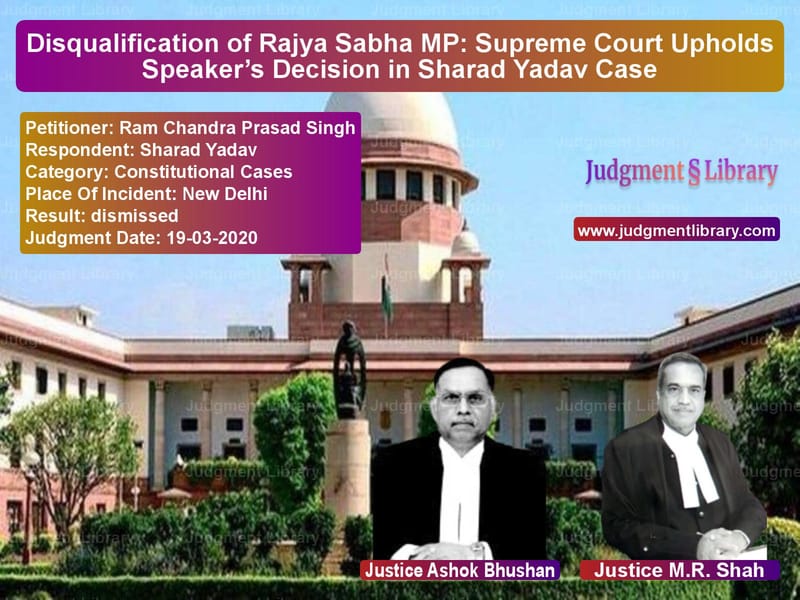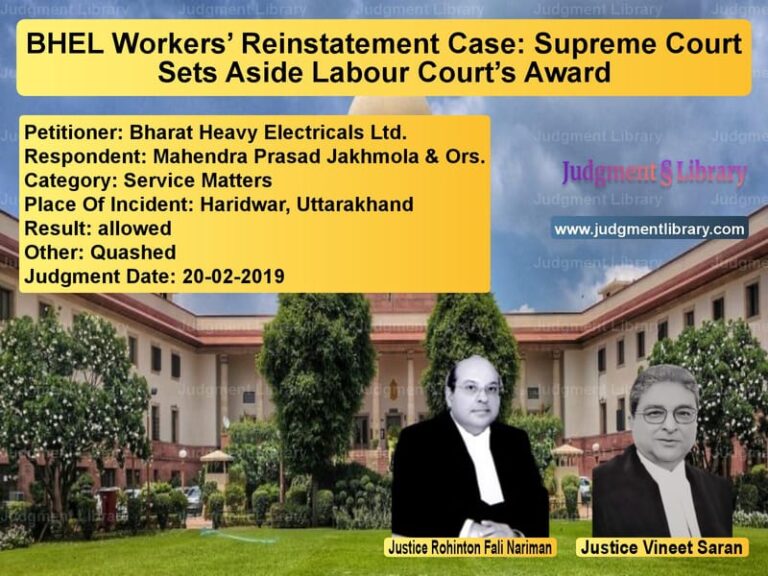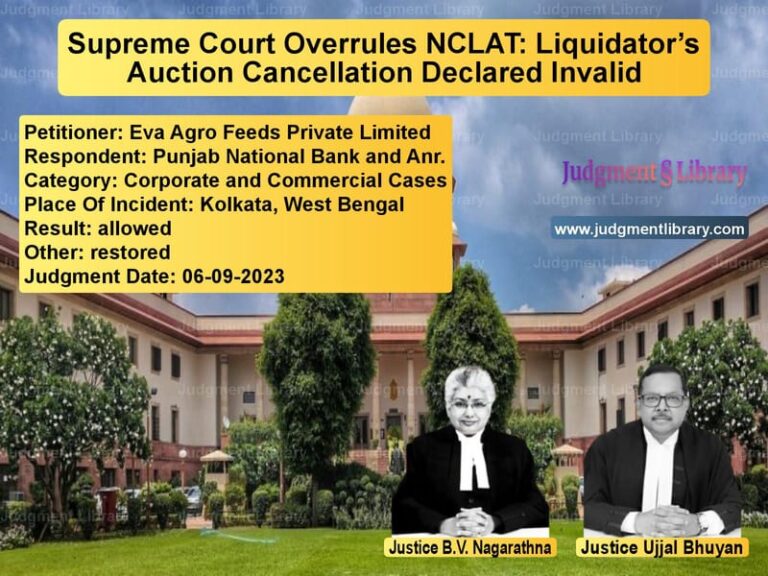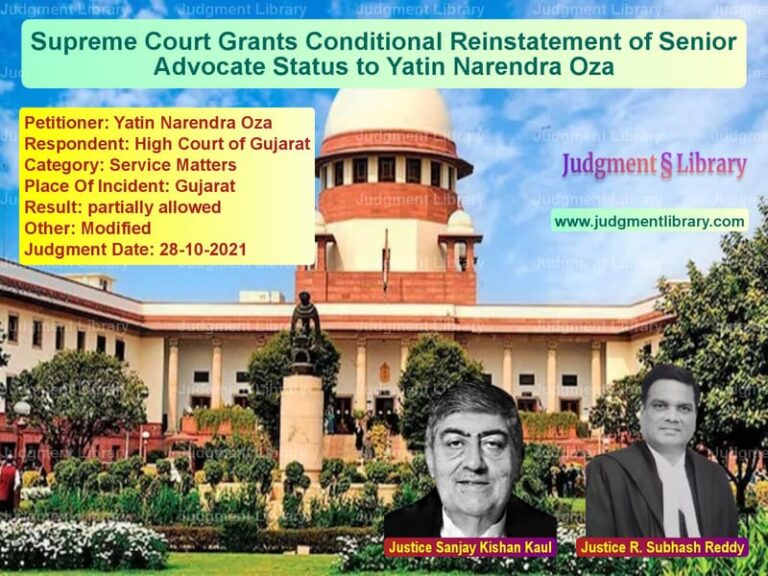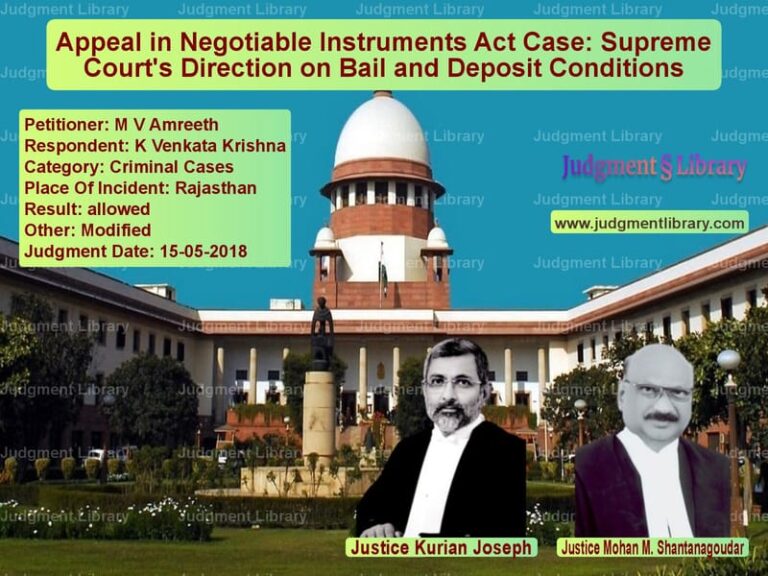Disqualification of Rajya Sabha MP: Supreme Court Upholds Speaker’s Decision in Sharad Yadav Case
The case of Ram Chandra Prasad Singh vs. Sharad Yadav revolves around the disqualification of a Rajya Sabha Member of Parliament under the anti-defection law outlined in the Tenth Schedule of the Indian Constitution. The Supreme Court examined whether the Delhi High Court had erred in rejecting the appellant’s plea to introduce additional evidence related to the respondent’s post-disqualification conduct.
Background of the Case
Sharad Yadav was elected as a Rajya Sabha MP from Bihar in 2016 on a Janata Dal (United) [JD(U)] ticket. However, internal political rifts within the party led to allegations that he had voluntarily given up his membership by aligning with the Rashtriya Janata Dal (RJD).
On September 2, 2017, the appellant, Ram Chandra Prasad Singh, a JD(U) MP and the party’s leader in the Rajya Sabha, filed a petition before the Chairman of the Rajya Sabha seeking Sharad Yadav’s disqualification under paragraph 2(1)(a) of the Tenth Schedule. He cited Sharad Yadav’s participation in RJD events and public criticism of JD(U) as grounds for his disqualification.
The Chairman of the Rajya Sabha ruled in favor of disqualification on December 4, 2017, stating:
“By his conduct, actions, and speeches, the respondent, Shri Sharad Yadav, has voluntarily given up his membership of JD(U) by which he was elected to the Rajya Sabha.”
Following this ruling, Sharad Yadav challenged his disqualification before the Delhi High Court.
Petitioner’s Arguments
Ram Chandra Prasad Singh, through his counsel, contended that:
- Sharad Yadav’s conduct, including his active participation in RJD rallies and statements against JD(U), indicated that he had voluntarily given up his membership.
- The respondent’s post-disqualification conduct, including launching the Loktantrik Janata Dal party in May 2018, reaffirmed his departure from JD(U).
- Additional evidence should be allowed in the pending writ petition before the Delhi High Court to further substantiate the claim that the disqualification was justified.
Respondent’s Arguments
Sharad Yadav, through his counsel, argued that:
- The disqualification should be determined based on his conduct before the Chairman’s ruling on December 4, 2017.
- His later actions, such as forming a new political party, were irrelevant to assessing the legality of the disqualification order.
- The High Court was correct in dismissing the application seeking to introduce additional evidence, as the disqualification was not based on post-facto developments.
Supreme Court’s Observations
The Supreme Court examined whether subsequent conduct could be considered in a writ petition challenging a disqualification under the Tenth Schedule. The Court observed:
- Disqualification occurs the moment a legislator voluntarily gives up their party membership or defies a party whip, not when the Speaker or Chairman issues a ruling.
- The Speaker’s decision is based on events preceding the disqualification petition, and subsequent conduct does not alter the validity of the ruling.
- While later events may reaffirm a person’s departure from their party, they cannot be the basis for determining whether disqualification was initially warranted.
- The High Court’s rejection of the additional evidence application was legally sound and did not prejudice the appellant’s case.
Final Judgment
The Supreme Court upheld the Delhi High Court’s order rejecting the plea for additional evidence. The Court ruled:
“The disqualification of a legislator under the Tenth Schedule is determined at the moment the act of defection occurs. The High Court was correct in ruling that subsequent events are not relevant to evaluating the legality of the disqualification order.”
The appeal was dismissed, but the Court clarified that in exceptional cases, later conduct could be examined if it sheds light on circumstances existing at the time of disqualification.
Impact of the Judgment
This ruling reinforces key principles of the anti-defection law:
- Finality of Speaker/Chairman’s Decision: The ruling clarifies that the Speaker’s or Chairman’s decision on disqualification is based on events prior to the ruling.
- Irrelevance of Post-Disqualification Conduct: Actions taken by a legislator after disqualification cannot retroactively influence the legality of the ruling.
- Judicial Review Limitations: Courts will assess disqualifications based on the material available at the time of the ruling, rather than later developments.
The judgment provides a clear interpretation of the Tenth Schedule, ensuring that legislative disqualification decisions remain legally robust and not influenced by post-facto events.
Petitioner Name: Ram Chandra Prasad Singh.Respondent Name: Sharad Yadav.Judgment By: Justice Ashok Bhushan, Justice M.R. Shah.Place Of Incident: New Delhi.Judgment Date: 19-03-2020.
Don’t miss out on the full details! Download the complete judgment in PDF format below and gain valuable insights instantly!
Download Judgment: Ram Chandra Prasad S vs Sharad Yadav Supreme Court of India Judgment Dated 19-03-2020.pdf
Direct Downlaod Judgment: Direct downlaod this Judgment
See all petitions in Fundamental Rights
See all petitions in Constitution Interpretation
See all petitions in Legislative Powers
See all petitions in Public Interest Litigation
See all petitions in Judgment by Ashok Bhushan
See all petitions in Judgment by Mukeshkumar Rasikbhai Shah
See all petitions in dismissed
See all petitions in supreme court of India judgments March 2020
See all petitions in 2020 judgments
See all posts in Constitutional Cases Category
See all allowed petitions in Constitutional Cases Category
See all Dismissed petitions in Constitutional Cases Category
See all partially allowed petitions in Constitutional Cases Category

